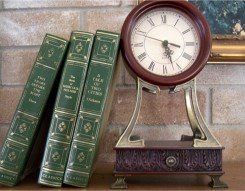Philip passed from the innocence of childhood to bitter consciousness of himself by the ridicule which his club-foot had excited. The circumstances of his case were so peculiar that he could not apply to them the ready-made rules which acted well enough in ordinary affairs, and he was forced to think for himself. The many books he had read filled his mind with ideas which, because he only half understood them, gave more scope to his imagination. Beneath his painful shyness something was growing up within him, and obscurely he realised his personality. But at times it gave him odd surprises; he did things, he knew not why, and afterwards when he thought of them found himself all at sea.
There was a boy called Luard between whom and Philip a friendship had arisen, and one day, when they were playing together in the school-room, Luard began to perform some trick with an ebony pen-holder of Philip's.
"Don't play the giddy ox," said Philip. "You'll only break it."
"I shan't."
But no sooner were the words out of the boy's mouth than the pen-holder snapped in two. Luard looked at Philip with dismay.
"Oh, I say, I'm awfully sorry."
The tears rolled down Philip's cheeks, but he did not answer.
"I say, what's the matter?" said Luard, with surprise. "I'll get you another one exactly the same."
"It's not about the pen-holder I care," said Philip, in a trembling voice, "only it was given me by my mater, just before she died."
"I say, I'm awfully sorry, Carey."
"It doesn't matter. It wasn't your fault."
Philip took the two pieces of the pen-holder and looked at them. He tried to restrain his sobs. He felt utterly miserable. And yet he could not tell why, for he knew quite well that he had bought the pen-holder during his last holidays at Blackstable for one and twopence. He did not know in the least what had made him invent that pathetic story, but he was quite as unhappy as though it had been true. The pious atmosphere of the vicarage and the religious tone of the school had made Philip's conscience very sensitive; he absorbed insensibly the feeling about him that the Tempter was ever on the watch to gain his immortal soul; and though he was not more truthful than most boys he never told a lie without suffering from remorse. When he thought over this incident he was very much distressed, and made up his mind that he must go to Luard and tell him that the story was an invention. Though he dreaded humiliation more than anything in the world, he hugged himself for two or three days at the thought of the agonising joy of humiliating himself to the Glory of God. But he never got any further. He satisfied his conscience by the more comfortable method of expressing his repentance only to the Almighty. But he could not understand why he should have been so genuinely affected by the story he was making up. The tears that flowed down his grubby cheeks were real tears. Then by some accident of association there occurred to him that scene when Emma had told him of his mother's death, and, though he could not speak for crying, he had insisted on going in to say good-bye to the Misses Watkin so that they might see his grief and pity him.
--On Human Bondage, Somerset Maugham, Chapter 13




No comments:
Post a Comment